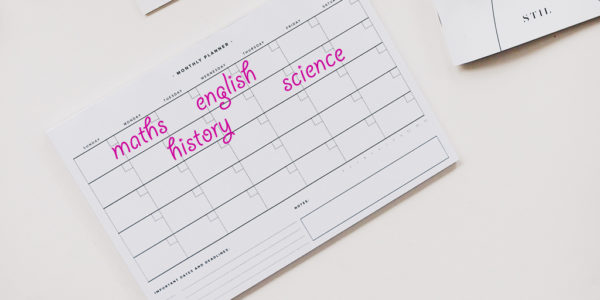See how to make a revision planner using notebooks or online tools that helps you study all your exam subjects in a realistic way.
If you have exams coming up soon or have recently taken exams, you probably just let out a groan at the mention of revision. Hardly anyone enjoys revising – but it is extremely important. Students who revise well consistently get higher grades than those who don’t. However, like many other things in life, revision goes better when you have a plan! See how to make the most effective revision plan – and stick to it.
Yes, a revision planner for exams is something you need!
There have been neuroscience studies which prove that writing down plans and goals makes us more likely to achieve them. This applies to exams and revision, too! Your revision planner should exist in a physical form, not just be a vague idea in your head.
What kind of revision planner do you need?
You can get (or make) different types of planner. Here are some ideas:
- Paper planner (e.g. noteboook)
- Board planner
- Online planner (or PDF)
Where can you get GCSE revision planners?
So your revision planner could be an actual physical study planner. You might prefer to use a wipe-clean board planner, which you can use to see what you need to do at a glance each week. Alternatively, an ordinary diary or notebook will work fine. There’s also the option of making one yourself on your computer, using a document or spreadsheet.
Then again, you can make your own revision timetable (for free) using a website or online tool like these:
- Get Revising has the advantage that you can take your study plan with you anywhere on your smartphone.
Once you’ve chosen your method, let’s get down to making your plan.
Step 1: Work out how much time you (realistically) have to revise
It’s no use planning to revise for 8 hours a day, every day. You won’t stick to it.
First, write down any existing commitments (this includes classes, regular hobbies, any plans you’ve made with friends or family, and your part-time job if you have one.)
Then plan out your week based on the time you have remaining. Try revising in 1-hour sessions, changing your study subject every 1 or 2 hours. You can work in longer sessions if that works for you.
Step 2: Decide which subjects you need to spend more or less time on
You don’t have to spend the same amount of time on each subject.
If you find one subject difficult and another easy, it makes sense to spend more time on the difficult subject. On the other hand, if you’re desperate for an A in one subject but would be satisfied with a passing grade in another, plan your time accordingly.
Step 3: Prioritise revision according to exam dates and amount of material
It sounds obvious, but your exams are likely to be spread out over a few weeks, so revise for the earlier ones first! There will also be heavier workloads for some subjects than others, and even multiple exams for some subjects. Make sure you’re dividing up your time appropriately. Write all your exam dates down in your planner!
Step 4: Build in breaks and downtime
You need to take breaks in order to maintain your focus. Ideally you should take a fifteen minute break every couple of hours, and a longer break (at least 30 minutes, but an hour is better) for lunch.
During this time, get away from your screen and desk! Take a walk, call a friend, play with the dog, or read a book for fun. You should also make sure your study schedule leaves enough time for you to see friends and family and get enough sleep. Unless you’re a real night-owl, try to stop work by dinnertime each evening.
Try to build in at least one complete day off each week. Your brain needs a rest and your mental health will thank you.
Step 5: Do the least fun bits first
Doing the tasks you hate first thing in the morning is the best way to get them out of the way quickly. The same is true for revision! Study the subjects you don’t like or find the hardest first. Your brain will be awake and fresh to tackle them more efficiently, and you won’t be dreading them all day.
Step 6: Make sure your revision plan is adaptable
Rigidity will only serve to stress you out! Perhaps you planned to do two hours of maths on Wednesday morning but found yourself spending longer than you expected on Physics instead. That’s not a problem, just swap your sessions or reprioritise. You also want to allow at least some room for spontaneity in your social life – so that if a party invitation you can’t refuse pops up, your work won’t suffer because you can just adapt your plan to account for it.
Step 7: Identify rewards
Make sure you reward yourself. How you do this is up to you! Maybe promise yourself that if you get all the way through that mock exam paper this morning, you’ll go and get ice-cream at lunchtime. Or perhaps successfully sticking to your plan all day means you get to play video games in the evening, guilt-free? If you stick to your plan for a whole week, you could even buy yourself something as a little treat, if you can afford to do so.
Free or very cheap reward ideas: a walk with a friend; taking a new book out of the library to read for pleasure; taking a long hot bath; working on your latest creative project; listening to your favourite music and dancing around your room.
Step 7: Schedule study sessions with friends
Everything is more fun with friends – even revision! Get a few friends together for study group sessions. These could happen at someone’s house, in the park, or in a coffee shop. Bring snacks, take a ten minute break to chat about non-school things every hour, and help each other out according to where your strengths are.
Step 8: Make sure you have all the resources you need
Nothing stops your revision intentions in their tracks like realising you left the book you need in your locker. Make sure you’ve got all the books, worksheets, mock exam papers and online resources you need before you get started.
Remember: the most important thing isn’t always to revise more, but to revise more smartly. Make a plan and stick to it, and you’re more than half way there. Good luck!







